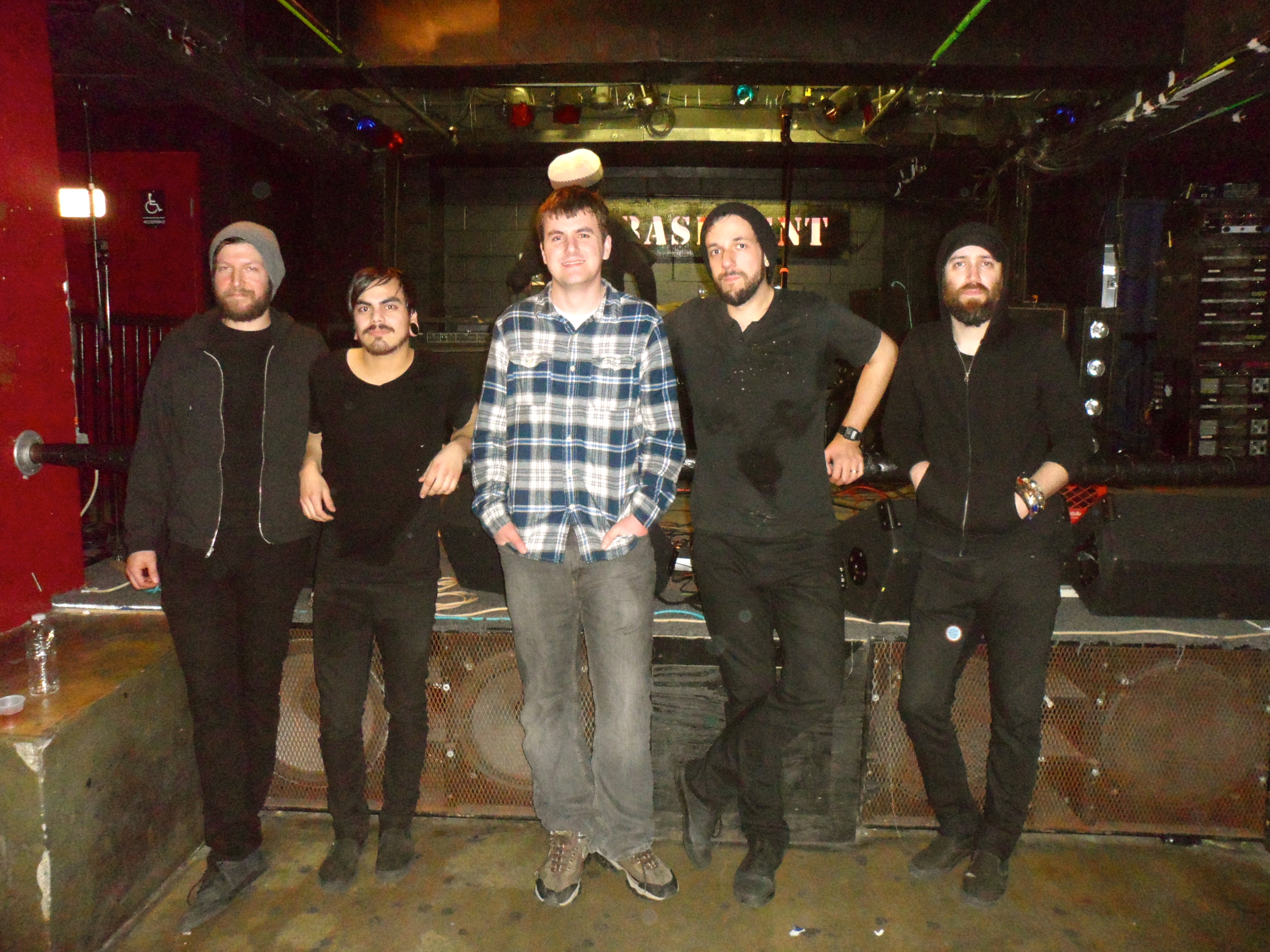Guess writer Ryan Getz recently got the chance to sit down with one of Vinyl Mag’s favorite artists, Junius, at their show at The Basement in Columbus, Ohio.
Check it out below, and be sure to check out his review of the show!
RG: If someone what Junius’ mission statement was, what would you say?
JOSEPH MARTINEZ (guitar, vocals): I don’t know…to push the arts (laughs). I don’t know, its not a political band. There’s no ulterior motives.
JOEL MUNGUIA (bass): To see how far we can take our style.
RG: How far do you want to take your style?
JOE: All the way!
RG: All the way?
JOE: Stadiums, dude. Stadiums.
RG: Does all the way mean to as many people as possible, or more musically?
JOE: Well musically we already got that. I mean, I don’t want to play basements for the rest of my life. I mean maybe some people do, but you gotta get it out to as many people as you can.
RG: What are your influences?
JOEL: 90s, midwestern, also shoe gaze bands – we’re all into shoe gaze bands. People throw around the word spacey a lot.
RG: Space rock?
JOEL: Yeah, heavy space rock. People usually know what that means.
RG: What’s it like being an artsy, space rock band on a label known for signing metal artists?
(they all laugh)
MICHAEL REPASCH-NIEVES (guitar): Its interesting. We’re definitely the oddball in a way, but we never really feel like we fit in anywhere. Our previous label was more of a post-rock label. We got pushed around with that a little bit – we were playing with mostly bands that didn’t have vocals for awhile. That was actually just as frustrating if not more so. At least now, generally there’s a certain camaraderie and open-mindedness in the metal community. We were kind of just starting as a DIY band touring for years in basements and just doing everything on our own…Most of that music is generally pretty extreme, and in circles we’ve come up with mostly heavier metal bands anyway. So somehow it doesn’t seem that weird to us to be honest.
RG: On your latest record you seem really fascinated by this whole life after death thing. Do you want to expand on that at all? Why did you go with that theme, and do you have any thoughts on the matter?
JOE: Well, yeah. After Matyrdom, our last album, was about the life of Immanuel Velikovsky. Last track, he dies. It’s his funeral basically. And then you think about the next concept. He dies; where did he go? It was just a jumping off point looking at that concept…So for example, no one knows unless you’ve died and come back. People who’ve died and come back are the only people who can even say anything about it…About 80% of near death experiences are pretty much the same process…All the characters can be different. The settings can be different, but the process is leaving your body, going to some sort of transitional place, having almost like a life review or whatever. A really basic process kind of in and of itself. [We] just kind of broke that down on each song as one of the steps of that process…The end is- I have no idea, because anybody that comes back hasn’t finished the whole process. So that’s kind of the more abstract song – the very last one. So you just kind of keep it like that, and you work through it logically – and obviously it’s artistic expression, so it’s a balance of the abstract and a logical approach.
RG: Do you guys have any personal beliefs on life after death and if so what are they?
JOE: On this album yeah. There seems be something happening. I don’t know what. I can tell you the process by which most people have died, but who knows? That’s the thing no one knows, based on the statistics and the anomalous instances that have happened where people are able to identify things that have happened after they’ve died – leave their body, traveling to places – and then can report back when they come to. It seems to me there’s something, but that’s just me.
RG: When it comes to the whole life after death theme, I’m just curious- is there a faith, religion, or philosophy that influences your view?
JOEL: I grew up Christian but fell out of practicing at some point, like 19 or 20. Now years later, I pretty much have no opinion – I’m pretty neutral on the whole thing. So the answer is there may be something else, but I have no idea.
MIKE: I believe in spirits and the concept of energy. Our concept of experiencing something doesn’t necessarily go away after you die. Essentially that carries over to the album….I believe in a spiritual journey of sorts that is determined by our actions in life.
RG: Okay, lets change to a less heavy topic. So you’re about halfway through the tour, how has that been going so far? What would be a highlight or a lowlight or any particular events that stood out?
MIKE: We’re only a week in right now. The O’Brother guys are really great. They’re a really good band – they’re good dudes. So far it’s been nothing but positivity, and we’re having a really good time. It’s been exciting to play – it’s our first tour since the album came out in October…It’s exciting to go out and play when people actually know them now, so yeah- it’s going well.
RG: How are the O’Brother guys? Camraderie’s good?
JOEL: They’re hilarious guys – constant jokes.
RG: I got to see them open for Thrice back in October, and I was really impressed.
JOE: Yeah, they’ve been on some really great tours, and it’s paid off. People know their stuff, know the lyrics, and they’re going pretty nuts for them.
RG: You’re a band that’s been around for awhile. From your point of view, what would you say is one positive thing and one negative thing that is happening in today’s music industry?
JOE: The positive is the sense that anything can happen. That people can make it without a label- that’s positive. Negative…it’s still hard to break through without having connections. No matter what, connections are always what matters.
MIKE: Or having a bunch or money.
JOE: Or having a bunch of money, because most of the bands that do really well are generally rich bands already, so they have money to go around. But that doesn’t discount hard work. You can do anything. With the internet, who knows?…It’s a good time [to be in music], but it’s also a bad time if you try to go traditional routes…If you’re younger that’s good, because you know about Twitter and all these things that I have no idea about…Mike’s learning a lot! It’s a really good time for young musicians coming up who already know these social networking things.
RG: I have one last question. If you are a new fan, what should you expect from your performance tonight?
JOEL: Loud!
Mike: Bring your earplugs!
JOEL: You’ll understand why we tour with metal bands.
MIKE: We’ve had problems from day 1 capturing our loudness, our intensity that we have live on the record. The new one is the closest we’ve come, but still, it doesn’t sound the same as we do live. A lot of people are surprised by that. I don’t think that’s necessarily a bad thing. It makes for two independent experiences. You can put on your iPod or headphones or blast it through the stereo, and that’s one experience. Then to see us live- that’s one thing you shouldn’t be able to miss. You can pirate music. You can download music. You can have mp3s, but if a band is good enough, that shouldn’t be a substitute for a live performance. I hope we succeed in presenting a performance that makes you feel that way.

